Unit 6 Do you like bananas? Section A Grammar Focus-4c课件(共24张PPT)2023-2024学年人教版英语七年级上册
文档属性
| 名称 | Unit 6 Do you like bananas? Section A Grammar Focus-4c课件(共24张PPT)2023-2024学年人教版英语七年级上册 |  | |
| 格式 | pptx | ||
| 文件大小 | 1.9MB | ||
| 资源类型 | 教案 | ||
| 版本资源 | 人教新目标(Go for it)版 | ||
| 科目 | 英语 | ||
| 更新时间 | 2023-07-22 10:45:02 | ||
图片预览


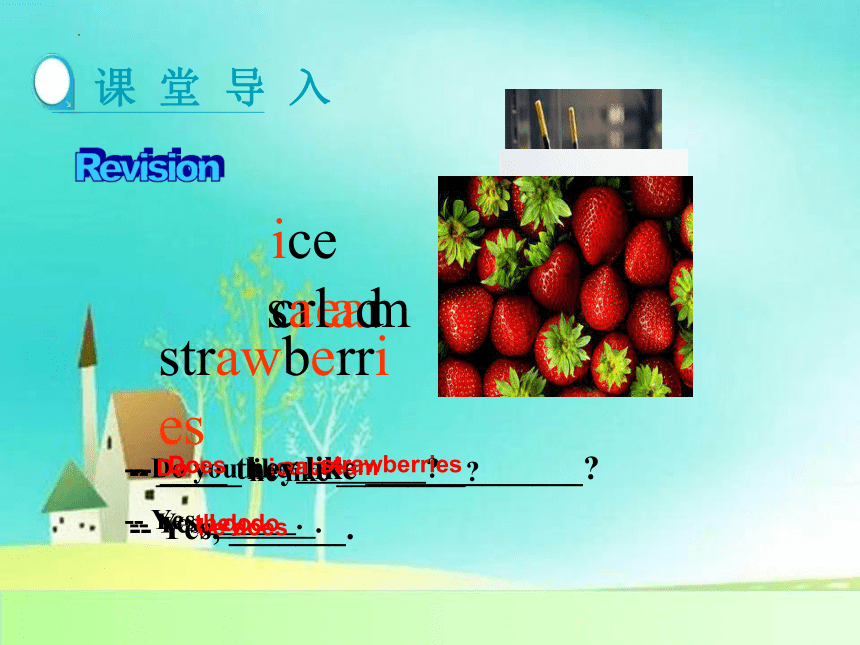
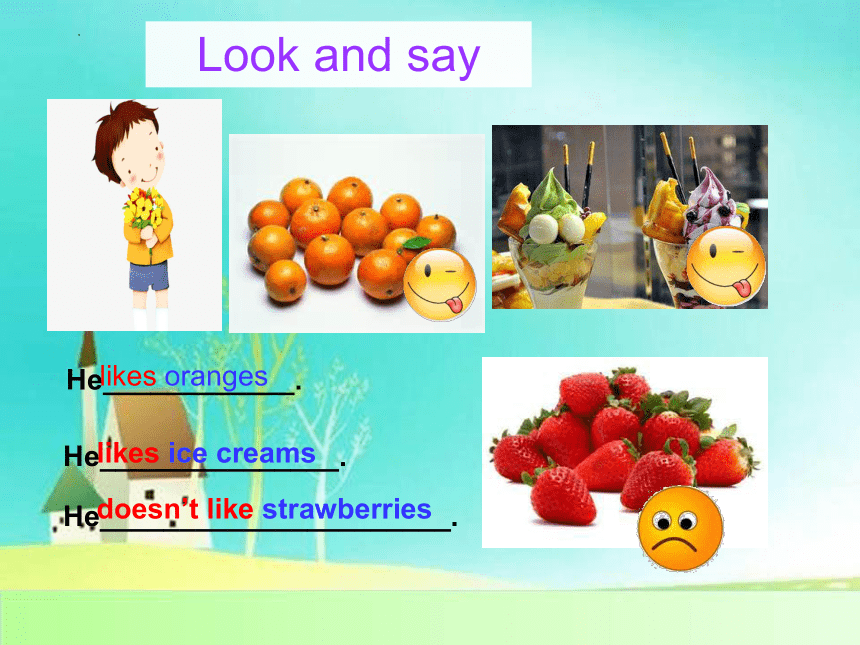

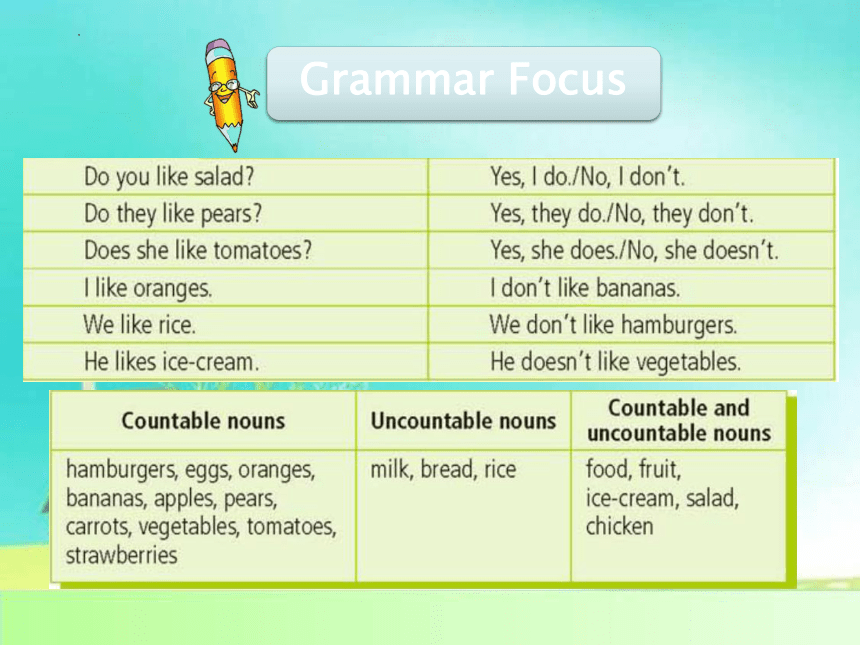
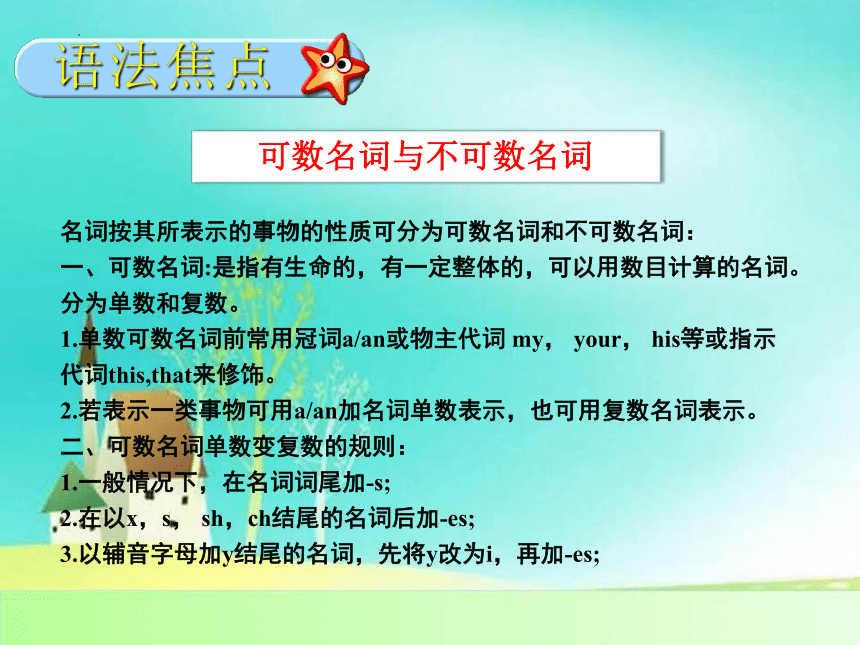
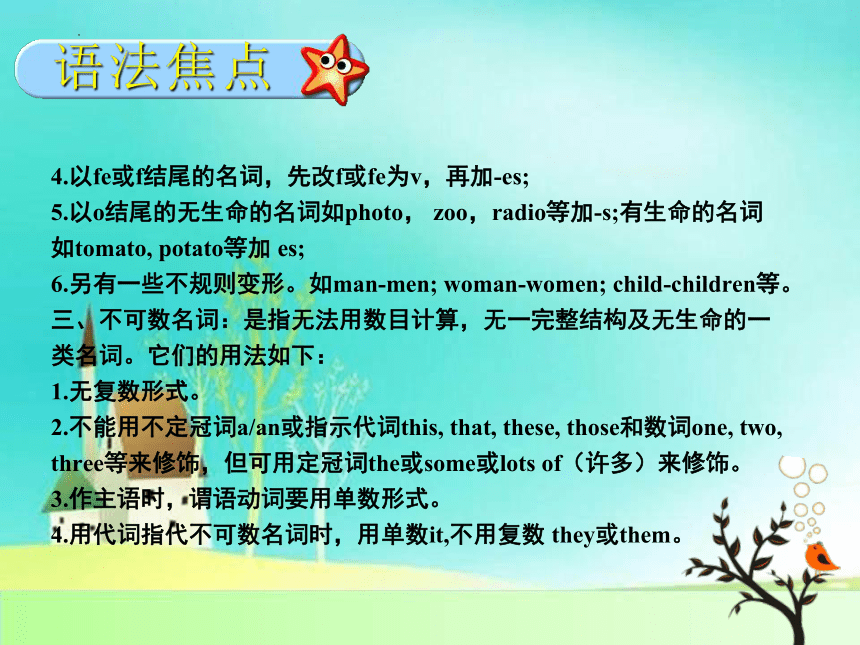

文档简介
(共24张PPT)
Section A
(GF-3c)
Unit 6
学 习 目 标
能够正确运用下列句型:
Do you like salad Yes, I do. /No, don’t.
Do they like pears Yes, they do. / No, they don’t.
Does he /she like tomatoes Yes, he/she does. No, he/she doesn’t.
1
3
能够正确区分可数名词和不可数名词。
掌握第三人称单数的用法。
2
-- Do you like _________
-- Yes, ______.
ice cream
I do
ice cream
-- ______ he like _________
-- Yes, _______.
salad
he does
salad
Does
-- ____ they like _____________
-- Yes, _______.
strawberries
they do
Do
strawberries
Revision
课 堂 导 入
He____________.
He______________________.
He_______________.
likes ice creams
likes oranges
doesn’t like strawberries
Look and say
She_________________.
She__________________.
She_________________.
likes hamburgers
doesn’t like pears
doesn’t like salad
Grammar Focus
语法焦点
可数名词与不可数名词
名词按其所表示的事物的性质可分为可数名词和不可数名词:
一、可数名词:是指有生命的,有一定整体的,可以用数目计算的名词。
分为单数和复数。
1.单数可数名词前常用冠词a/an或物主代词 my, your, his等或指示
代词this,that来修饰。
2.若表示一类事物可用a/an加名词单数表示,也可用复数名词表示。
二、可数名词单数变复数的规则:
1.一般情况下,在名词词尾加-s;
2.在以x,s, sh,ch结尾的名词后加-es;
3.以辅音字母加y结尾的名词,先将y改为i,再加-es;
语法焦点
4.以fe或f结尾的名词,先改f或fe为v,再加-es;
5.以o结尾的无生命的名词如photo, zoo,radio等加-s;有生命的名词
如tomato, potato等加 es;
6.另有一些不规则变形。如man-men; woman-women; child-children等。
三、不可数名词:是指无法用数目计算,无一完整结构及无生命的一
类名词。它们的用法如下:
1.无复数形式。
2.不能用不定冠词a/an或指示代词this, that, these, those和数词one, two,
three等来修饰,但可用定冠词the或some或lots of(许多)来修饰。
3.作主语时,谓语动词要用单数形式。
4.用代词指代不可数名词时,用单数it,不用复数 they或them。
1. I like fruit, but I (don’t / doesn’t) like vegetables.
2. She (like / likes) bread, but she (doesn’t / don’t) like salad.
3. He (like / likes) bananas, but he (don’t / doesn’t) like oranges.
3a
Underline the correct words in the brackets.
第三人称单数形式
4. We (likes / like) hamburgers, but we (don’t / doesn’t) like chicken.
5. They (likes / like) pears, but they (don’t / doesn’t) like strawberries.
第三人称复数形式
Number these sentences [1-4] to make a conversation.
3b
口So, let's get salad. 口Yes, I do.
口Do you like salad
口OK.
1
3
2
4
3c
Food Survey
Do You Like…
Ask your classmates about the food in the chart. Find out what they like and don’t like.
Pairwork
Like this:
A: Hello! Do you like …
B: Yes, I do. I like …
/No, I don’t. I don’t like…
A: Does Lucy like …
B: Yes, she does. She likes …
/No, she doesn’t. She doesn’t like …
Do a report:
Hello, everyone! I like …, … and … But I don’t
like …, …or … Lucy likes …, … and … But she
doesn’t like …, … or …
Pair work
Does he \she like…
Yes, he \she does. No, he\she doesn’t.
Bob
Gina
food likes doesn’t like
tomatoes
hamburger
bananas
French fries
broccoli
salad
ice cream
Food survey
A: _____she ____ __________
B: Yes, __________.
Look and say
Does
like
hamburgers
she does
A: _____she ____ ________
B: No, __________.
Does
like
bananas
she doesn’t
He____________.
He______________________.
He_____________.
likes broccoli
likes oranges
doesn’t like strawberries
She_________________.
She__________________.
She_________________.
likes French fries
doesn’t like pears
doesn’t like salad
根据中文意思或首字母提示,用单词的适当形式填空,每空一词。
1. It is a (正确的) answer.
2. Some (草莓) are on the table.
3. Tomatoes and carrots are .
4. —Mom, I want to drink some .
—Sure.
5. Today is my grandma’s 75th .
We want to have a party for her.
right
strawberries
vegetables
orange
birthday
三、 根据中文提示完成句子,词数不限。
1. —你喜欢水果吗?—是的,我喜欢。
— Do you ?—Yes, .
2. 艾丽斯不喜欢鸡肉,凯特不喜欢鸡蛋。
Alice and Kate .
3. 我妈妈早餐吃面包和牛奶。
My mother for breakfast.
like fruit
I do
doesn’t like chicken
doesn’t like eggs
has bread and milk
4. 一些橙汁在桌子上。
Some on the table.
5. 吃冰激凌怎么样?
ice-cream?
orange is
How/What about eating/having
翻译句子
1. 她晚饭后喜欢吃水果。
2. 我叔叔不喜欢吃橙子。
3. 汤姆喜欢沙拉吗?
She likes eating/having fruits after dinner.
My uncle doesn’t like eating/having oranges.
Does Tom like salad?
4. 吃蔬菜怎么样?
5. 让我们想一下晚餐的水果。
How/What about eating/having vegetables?
Let’s think about the fruit for dinner.
1. Review Grammar.
2. Preview the new words and expressions.
Section A
(GF-3c)
Unit 6
学 习 目 标
能够正确运用下列句型:
Do you like salad Yes, I do. /No, don’t.
Do they like pears Yes, they do. / No, they don’t.
Does he /she like tomatoes Yes, he/she does. No, he/she doesn’t.
1
3
能够正确区分可数名词和不可数名词。
掌握第三人称单数的用法。
2
-- Do you like _________
-- Yes, ______.
ice cream
I do
ice cream
-- ______ he like _________
-- Yes, _______.
salad
he does
salad
Does
-- ____ they like _____________
-- Yes, _______.
strawberries
they do
Do
strawberries
Revision
课 堂 导 入
He____________.
He______________________.
He_______________.
likes ice creams
likes oranges
doesn’t like strawberries
Look and say
She_________________.
She__________________.
She_________________.
likes hamburgers
doesn’t like pears
doesn’t like salad
Grammar Focus
语法焦点
可数名词与不可数名词
名词按其所表示的事物的性质可分为可数名词和不可数名词:
一、可数名词:是指有生命的,有一定整体的,可以用数目计算的名词。
分为单数和复数。
1.单数可数名词前常用冠词a/an或物主代词 my, your, his等或指示
代词this,that来修饰。
2.若表示一类事物可用a/an加名词单数表示,也可用复数名词表示。
二、可数名词单数变复数的规则:
1.一般情况下,在名词词尾加-s;
2.在以x,s, sh,ch结尾的名词后加-es;
3.以辅音字母加y结尾的名词,先将y改为i,再加-es;
语法焦点
4.以fe或f结尾的名词,先改f或fe为v,再加-es;
5.以o结尾的无生命的名词如photo, zoo,radio等加-s;有生命的名词
如tomato, potato等加 es;
6.另有一些不规则变形。如man-men; woman-women; child-children等。
三、不可数名词:是指无法用数目计算,无一完整结构及无生命的一
类名词。它们的用法如下:
1.无复数形式。
2.不能用不定冠词a/an或指示代词this, that, these, those和数词one, two,
three等来修饰,但可用定冠词the或some或lots of(许多)来修饰。
3.作主语时,谓语动词要用单数形式。
4.用代词指代不可数名词时,用单数it,不用复数 they或them。
1. I like fruit, but I (don’t / doesn’t) like vegetables.
2. She (like / likes) bread, but she (doesn’t / don’t) like salad.
3. He (like / likes) bananas, but he (don’t / doesn’t) like oranges.
3a
Underline the correct words in the brackets.
第三人称单数形式
4. We (likes / like) hamburgers, but we (don’t / doesn’t) like chicken.
5. They (likes / like) pears, but they (don’t / doesn’t) like strawberries.
第三人称复数形式
Number these sentences [1-4] to make a conversation.
3b
口So, let's get salad. 口Yes, I do.
口Do you like salad
口OK.
1
3
2
4
3c
Food Survey
Do You Like…
Ask your classmates about the food in the chart. Find out what they like and don’t like.
Pairwork
Like this:
A: Hello! Do you like …
B: Yes, I do. I like …
/No, I don’t. I don’t like…
A: Does Lucy like …
B: Yes, she does. She likes …
/No, she doesn’t. She doesn’t like …
Do a report:
Hello, everyone! I like …, … and … But I don’t
like …, …or … Lucy likes …, … and … But she
doesn’t like …, … or …
Pair work
Does he \she like…
Yes, he \she does. No, he\she doesn’t.
Bob
Gina
food likes doesn’t like
tomatoes
hamburger
bananas
French fries
broccoli
salad
ice cream
Food survey
A: _____she ____ __________
B: Yes, __________.
Look and say
Does
like
hamburgers
she does
A: _____she ____ ________
B: No, __________.
Does
like
bananas
she doesn’t
He____________.
He______________________.
He_____________.
likes broccoli
likes oranges
doesn’t like strawberries
She_________________.
She__________________.
She_________________.
likes French fries
doesn’t like pears
doesn’t like salad
根据中文意思或首字母提示,用单词的适当形式填空,每空一词。
1. It is a (正确的) answer.
2. Some (草莓) are on the table.
3. Tomatoes and carrots are .
4. —Mom, I want to drink some .
—Sure.
5. Today is my grandma’s 75th .
We want to have a party for her.
right
strawberries
vegetables
orange
birthday
三、 根据中文提示完成句子,词数不限。
1. —你喜欢水果吗?—是的,我喜欢。
— Do you ?—Yes, .
2. 艾丽斯不喜欢鸡肉,凯特不喜欢鸡蛋。
Alice and Kate .
3. 我妈妈早餐吃面包和牛奶。
My mother for breakfast.
like fruit
I do
doesn’t like chicken
doesn’t like eggs
has bread and milk
4. 一些橙汁在桌子上。
Some on the table.
5. 吃冰激凌怎么样?
ice-cream?
orange is
How/What about eating/having
翻译句子
1. 她晚饭后喜欢吃水果。
2. 我叔叔不喜欢吃橙子。
3. 汤姆喜欢沙拉吗?
She likes eating/having fruits after dinner.
My uncle doesn’t like eating/having oranges.
Does Tom like salad?
4. 吃蔬菜怎么样?
5. 让我们想一下晚餐的水果。
How/What about eating/having vegetables?
Let’s think about the fruit for dinner.
1. Review Grammar.
2. Preview the new words and expressions.
同课章节目录
- starters 预备篇(2012秋审查)
- Unit 1 Good morning !
- Unit 2 What’s this in English?
- Unit 3 What color is it ?
- Unit 1 My name's Gina.
- Section A
- Section B
- Unit 2 This is my sister.
- Section A
- Section B
- Unit 3 Is this your pencil?
- Section A
- Section B
- Unit 4 Where's my schoolbag?
- Section A
- Section B
- Unit 5 Do you have a soccer ball?
- Section A
- Section B
- Unit 6 Do you like bananas?
- Section A
- Section B
- Unit 7 How much are these socks?
- Section A
- Section B
- Unit 8 When is your birthday?
- Section A
- Section B
- Unit 9 My favorite subject is science.
- Section A
- Section B
